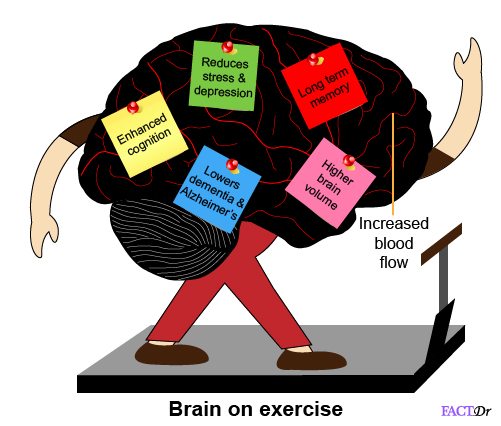How exercise can improve brain health
Researchers say one new case of dementia is detected every four seconds globally. They estimate that by the year 2050, more than 115 million people will have dementia worldwide.
Thats a little scary….
Dementia, alzheimers, losing brain cognition……its all around us. We ALL know someone directly or indirectly who is stricken some form of it. There are signs, posters,tv and radio shows ad nauseam regarding this epidemic.
A few weeks ago I was having a conversation with my 80 yr old aunt after our workout session. She was talking about looking into things to stimulate and help keep and even improve her brain health. Ah ha! I thought…..I’ll write some stuff down for her…..and before I knew it I was neck deep in study upon study that shows us that we can indeed have a positive effect on the health of our brain. Whether you feel terrifically cognitive, are struggling with brain fog, have onset cognitive decline or are in the middle of serious case of it, it is worth devoting bit of time to the health of your brain. I can’t think of a lot worse than going down the slippery slop of mental decline. Only fairly recently, studies have emerged showing, that as adults, we can do plenty to change the state of our brain. Previously it was thought that only children experienced could grow new brain cells. Now we know that adults are able to direct increases in neuroplasticity (changes in the brain) and neurogenesis (birth of new brain cells)
We are the only species to direct our own plasticity as adults -
Thats a huge thing! We all have the power to increase our brain capacity and repair it too …… and so do the loved ones around you …. best of all, it is FREE!
The brain is a wonderful, mysterious organ. It communicates with the entire body. It regulates our hormones and therefore our energy, movements, emotions/ mental state. It is composed of fat predominantly. Its current state is mainly due to all our PAST dietary intake, movements (physical and mental), and emotional states. Its wellbeing and future is directed by what you choose to do now in each of those things, and also its affected by our age (thats a little harder to control, but people are working on it!)
Lets address each of those areas that we have control over.
First -
Exercise.
Exercise helps the brain directly and indirectly. During exercise, blood flow, oxygen, the growth of new blood cells and neurogenesis increases, insulin sensitivity increases, the release of growth factors is stimulated and chemicals affecting the abundance and survival of new brain cells is increased
Indirectly, exercise improves mood and sleep, and reduces stress and anxiety and improves your ability to deal with stresses.
So what kind of exercise?
Aerobic
Aerobic style training like walking, and running, is shown to have a positive affect on the regions of memory and retention.
In fact walking, 30-45 minutes three times a week, is enough to delay the onset of dementia as shown by a 6 month 2006 study with sedentary people aged 60-79 years. The walking increased to increase brain volume even more than stretches and toning.
Dancing also has been found to improve cognition and neural-plasticity. If the thought of your two left feet make you shudder a little, the linked study showed that the benefits were regardless of how naturally talented or not these people were, in fact, those less gifted showed the most gain, I’m surmising that is due to increased demand on the brain to learn the moves. So no excuse, turn some music on and get movin n groovin!
Stretching
Stress, depression, traumatic brain brain injuries all shrink the hippocampus, the centre for memory and emotional regulation. Exercise has been shown to be, slightly more effective than other modalities such as medication and counselling at relieving depression. A wonderful body stretching session of yoga will increase overall brain wave activity, brain volume and activation in both the amygdala and frontal cortex.
Studies measuring mental health outcomes have shown decreases in anxiety, and increases in cognitive performance after yoga interventions
When you feel sad or stressed, try a walk or some stretches combined with deep breathing
Lifting heavy things
A 12 month study was done to see if strength training could also have significant effects to neural-plasticity. They found that training twice a week had a significant effect on this whereas training just once a week did not…..interesting
For your best brain health, it needs stimulation from a variety of movements as each part of the body is connects and communicates with various areas of the brain. As the Chinese use meridian points to influence related parts of the body, so this applies to our brain. Small movements like finger wriggling will influence certain brain neurons, and these neurons won’t be influenced without those movements. In a real world example, people confined suddenly to bed and no longer moving their lower bodies very much tend to suddenly show steep cognitive declines. This recent study found that limited physical activity decreased the number of neural stem cells by 70 % and cells that are supportive and protective to nerve cells were no longer able to fully mature. In particular it found that weight bearing leg exercises were shown to have the most benefit. Leg weighted exercise sends signals to the brain that are vital for the production of healthy neural cells, essential for the brain and nervous system.
But, is getting hot and sweaty necessary? …. kinda ….
Beta Amyloid is a protein that comprises the plaque that is found to be built up in the brains of Alzheimers sufferers This build up is caused by proteins becoming disfigured and clumping together. Something that is able to break down and prevent this build up are heat shock proteins. These heat shock proteins are activated by the heat stress that you feel during saunas and during a decent exercise session. When activated, they can be used as structural scaffolding to other proteins and prevent the beta amyloid form clumping together.
It is clear,
purposeful exercise is a vital way to keep your brain healthy. It increases neural plasticity, blood flow, increases dopamine and endorphins, increases brain volume, memory, focus. It can help the brain self regulate and calm down from stressful events. PLUS you’re burning calories at the same time! Exercise, a gift that keeps giving
Bring this into your world
Try to incorporate a variety of purposeful movement in everyday for 30-60 minutes. Get in a bit of each of the following:
Aerobic:
Long walks, riding, rowing, jogging etc
Strength:
Lift some heavy things at the gym
Do body weight moves like lunging, squatting, twisting, pushups, pulling.
Stretch.
Yoga is terrific and is also very adaptive it can be made as strong or gentle as you need it to be. There's also Tai Chi, dance, pilates and many other options available. Get inspiration from animals and see how they stretch constantly throughout the day.
A typical day might be …..
Wakeup and go for a walk for 30 mins. Then stretch, maybe some sun salutations (link) which stretch the whole body.
Later in the day either before lunch or before dinner (as this has a great effect on insulin levels) do 10 each of the following, squats, pushups, lateral lunge with shoulder press, deadlifts, calf raises, rows (link). Repeat this for 2 to 4 times through and increase weights when it feels a little easy.
Before bed do some foam rolling……
…….. Voila!
Next, coming up as soon as possible ...
….. Nutrition!
More Brain Exercise Links:
https://www.quickanddirtytips.com/health-fitness/exercise/how-exercise-affects-your-brain?
https://www.brainmdhealth.com/blog/best-ways-to-take-care-of-your-brain
https://www.brainmdhealth.com/blog/wp-content/uploads/2015-02-13_MW_Infographic.jpeg
https://www.nia.nih.gov/news/putting-exercise-test-people-risk-alzheimers
https://scienceblog.com/486023/study-mental-physical-exercises-produce-distinct-brain-benefits/
https://eurekalert.org/pub_releases/2018-05/f-lei051718.php#

